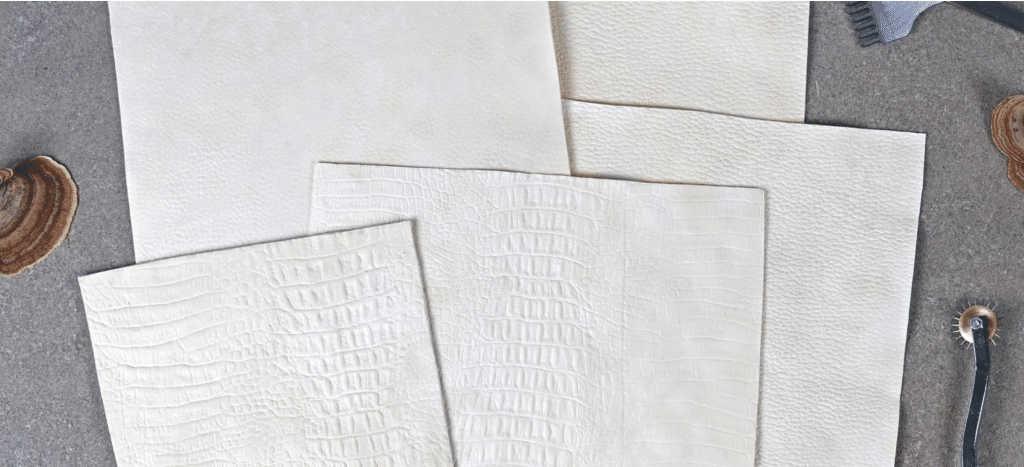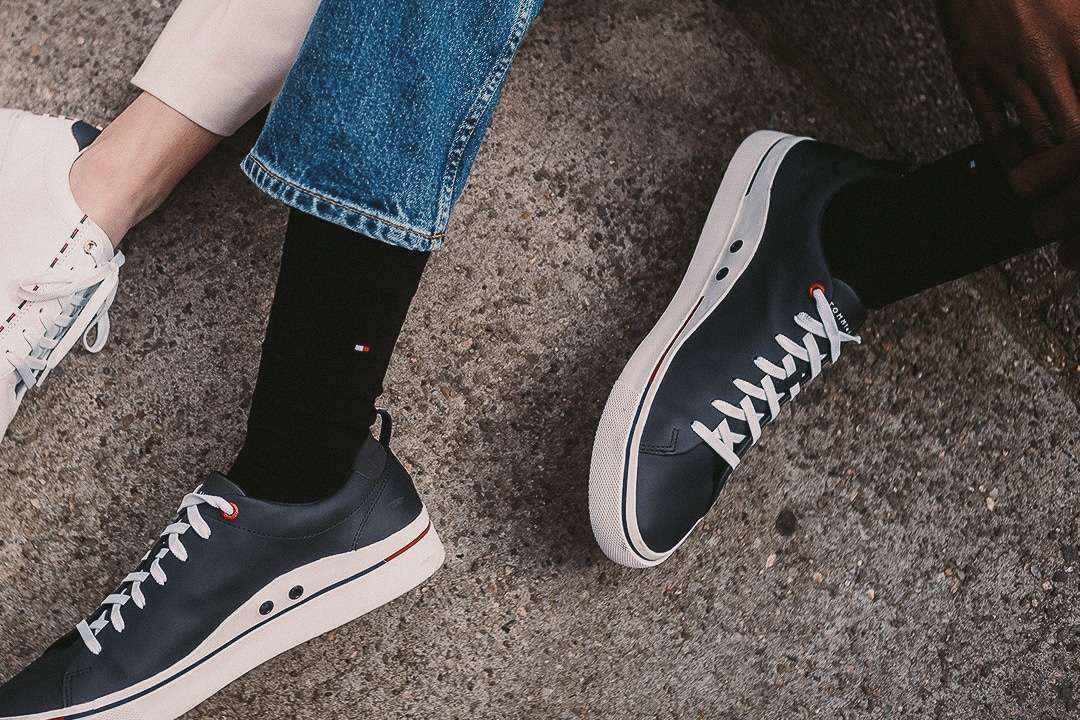A new coalition of brands including Tommy Hilfiger and Calvin Klein are aiming to bring sustainable, vegan mushroom leather to market in a big way.
Mycelium technology company Ecovative is launching its first cooperative targeting sustainable fashion. PVH Corp and Bestseller–parent companies to Tommy Hilfiger, Calvin Klein, Vero Moda, and Y.A.S.—have signed on as founding members.
The initiative is focused on Ecovative’s Forager Hides—mycelium-based mushroom leather. The brands in the PVH Corp and Besteller collectives will work with Ecovative to create alternatives to traditional animal leather using mushroom materials.
“By marrying innovation with legacy, we can focus on what we do better than anyone else in the world—growing the best mycelium at commercial scale,” Gavin McIntyre, Ecovative Co-Founder and Chief Business Officer, said in a statement. “Working directly with fashion brands and tanneries, we make beautiful, high-performing, and sustainable materials without harming animals or the planet.”
Ecovative worked with the Fashion for Good platform to build the cooperative.
“Biomaterials have been in development for years, but they have yet to reach even a small portion of customers,” said Katrin Ley, Managing Director of Fashion for Good. “Ecovative has been focused on scaling its technologies to deliver mycelium at the scale necessary for industry leaders like BESTSELLER and PVH Corp. This is an exciting development in the drive to scale up these solutions and increase accessibility.”
Mushroom leather
Mushroom leather has been touted as a highly sustainable alternative to cow leather. Traditional cow leather, as with all animal agriculture, is a leading contributor to climate change. Its a leading contributor to greenhouse gas emissions, and run-off waste contributes to hypoxic ocean zones known as “dead zones.”
According to EPA data, factory farms account for 70 percent of water pollution in the U.S. But the vast majority of leather comes from overseas, with India and China leading the markets. Tanning leather is one of the most toxic industries for human and ecological health. There are also less stringent safety measures in place outside of the U.S., making the leather industry more hazardous.
Mushroom leather from Ecovative as well as Bolt Threads and MycoWorks is all currently produced in the U.S.
Ecovative’s Forager Hides is made from a second-generation mycelium material at its Mycelium Foundry, which has the potential to produce 3 million square feet of its mushroom leather annually on only one acre of land.

“Our Mycelium Foundry uses the most comprehensive fungal strain library for mycological material technology in the world. Drawing from this library for our proprietary AirMycelium™ process, we amplify and leverage the natural properties of specific strains to grow unique bio-materials that meet our clients’ needs,” the company website reads.
Stella McCartney recently debuted a vegan mushroom leather handbag during September’s Fashion Week in Paris. She partnered with Bolt Threads on its Mylo “Un-leather,” with 100 of the bags available for sale.
“[It’s] not killing any animals; it’s not cutting down any trees. It’s the future of fashion if you can get it right, and I think we can,” she said. “It’s the beginning of something new.”
Leading French luxury label Hermès also announced its first vegan mushroom leather bag earlier this—an iteration of its popular Victoria travel bag, made from the mycelium leather produced by Bay Area startup MycoWorks.
While mushroom leather appears to be the holy grail in sustainable leather alternatives, it’s not the only option on the market. Leather made from apples, cacti, wine grapes, pineapple, and other plant-based materials have been gaining traction in recent years. Pineapples have figured heavily in the alternative market, with Hugo Boss and Chanel both experimenting with the material.
Sustainable fashion comes to Tommy Hilfiger and Calvin Klein
The new initiative could see the biggest boom in leather alternatives, especially with leading labels at the helm. Ecovative has seen rapid growth since launching in 2007. One of its most notable partnerships has been with Swedish home furnishings giant, IKEA; it makes a biodegradable mushroom packaging to help the furniture chain decrease its environmental footprint.
The Hilfiger brand has been embracing sustainability in recent collections, offering items made from organic cotton and upcycled materials. But it’s traditionally been a leather-heavy brand, limited in its use of alternative leather. This partnership aims to change that. Likewise, Calvin Klein has set a science-based target to reduce emissions generated from its own operations and supply chain. It has also embraced some sustainable materials in recent collections.

“At PVH we are excited to explore innovations that reduce the environmental impact of our products,” said Rebecca England, VP Innovation, PVH Europe. “Mycelium provides us with an opportunity to respond to growing consumer interest in lower impact products while supporting quality and design that meet the needs and expectations of our consumers – in this case, made with 100% bio-based resources. We look forward to testing and learning alongside our partners to create scalable, sustainable solutions.”
For Bestseller’s brands, which tend to vie for the budget-conscious shopper, the partnership is an opportunity to look at scaling and cost-competitive alternatives that are low impact on the production side and biodegradable at the end of their life-cycle.
“Mycelium shows great potential in the fashion innovation sphere – it even extends far beyond our own industry,” said Anders Schorling Overgård, BESTSELLER’s Sustainable Materials Engineer. “We are keen on diving into the product development phase and really understanding the aesthetics and actual performance of Ecovative’s innovative materials in the lab.”


